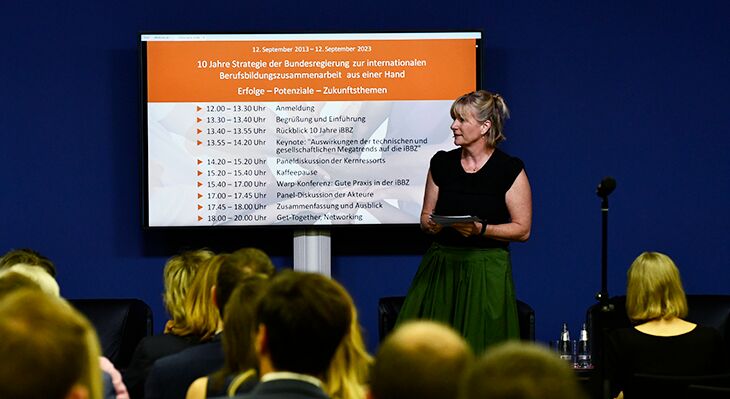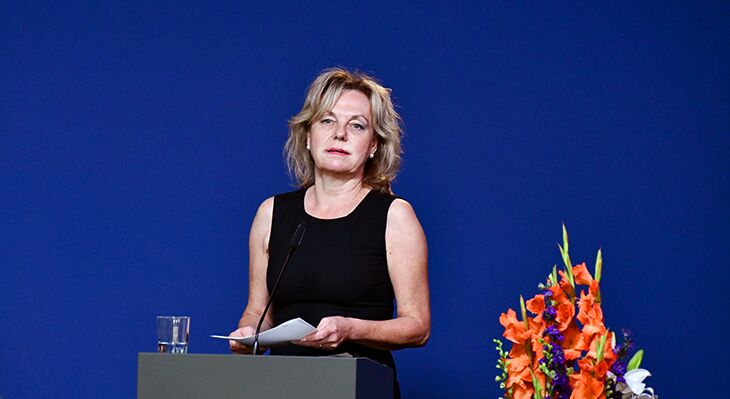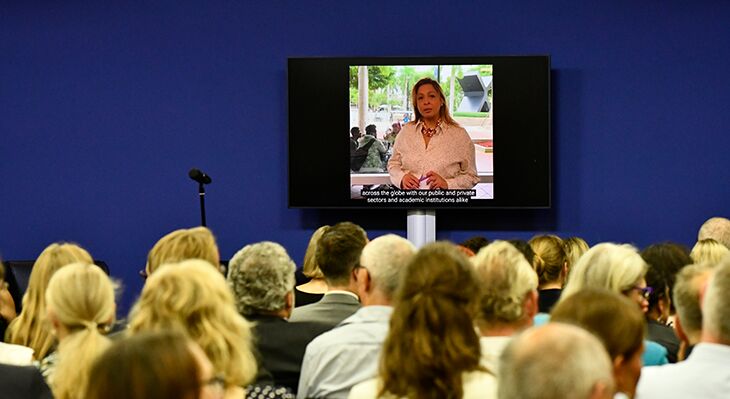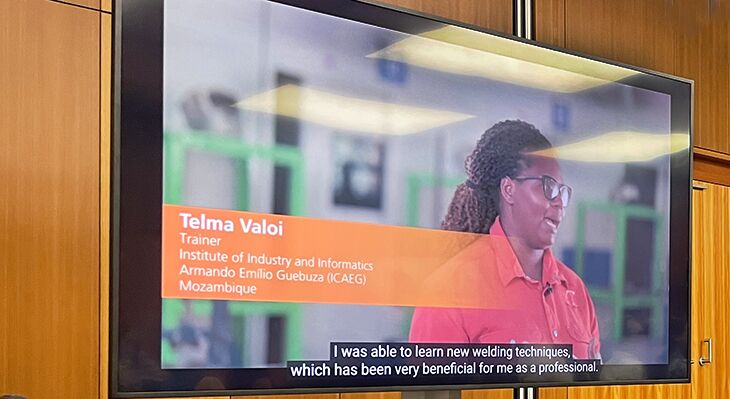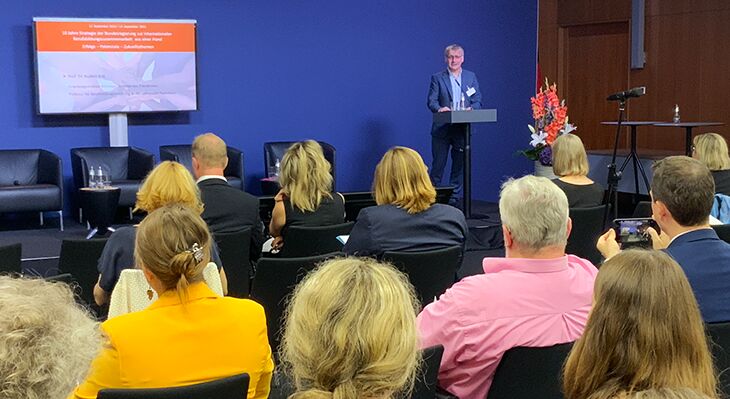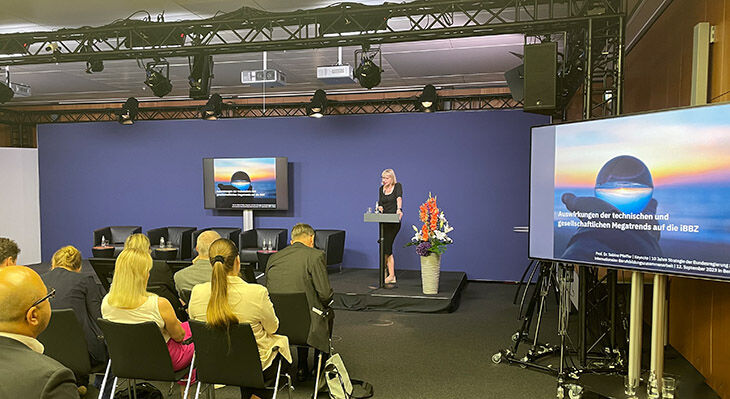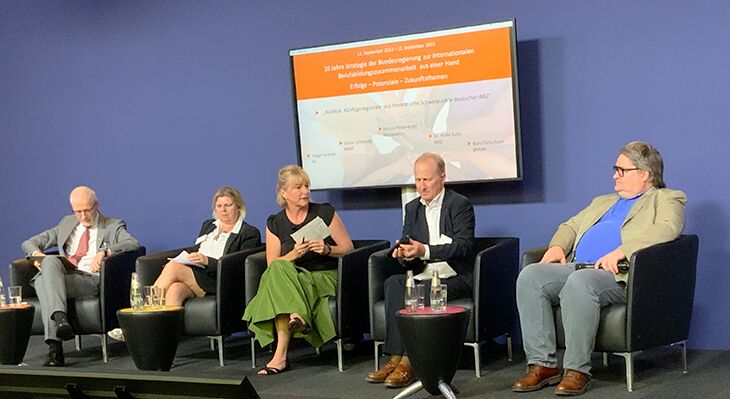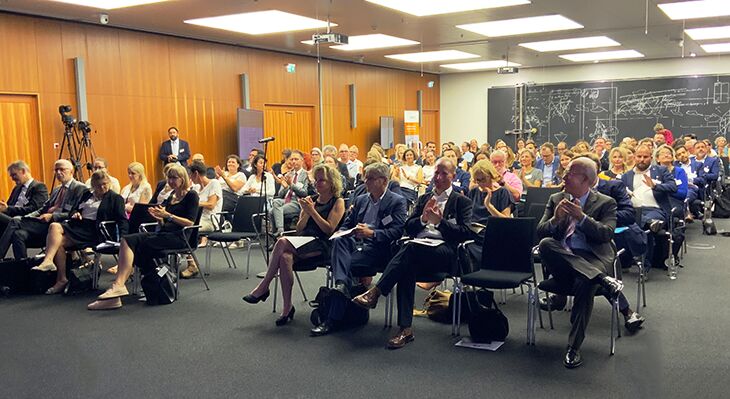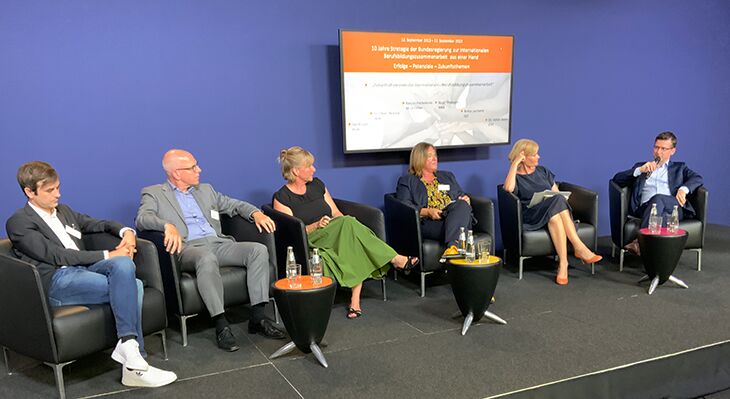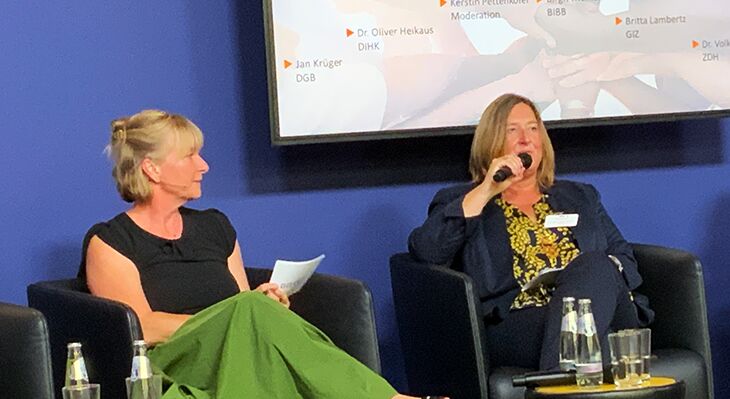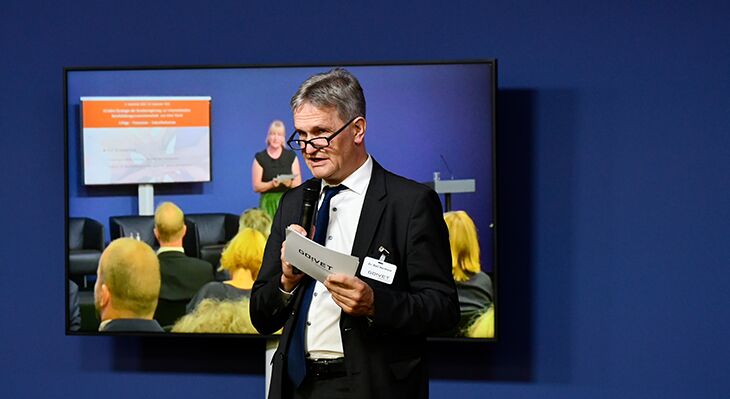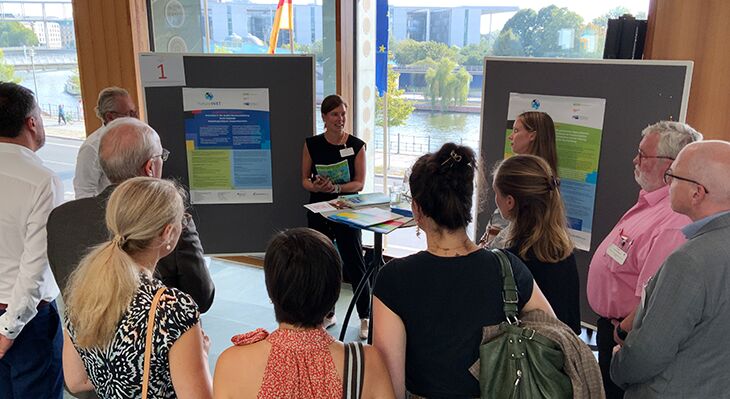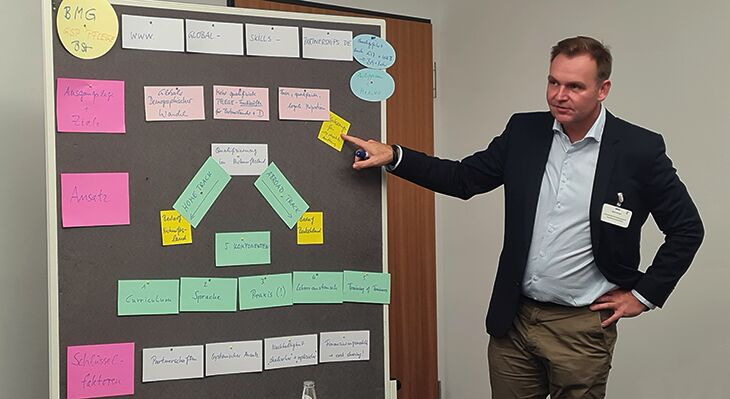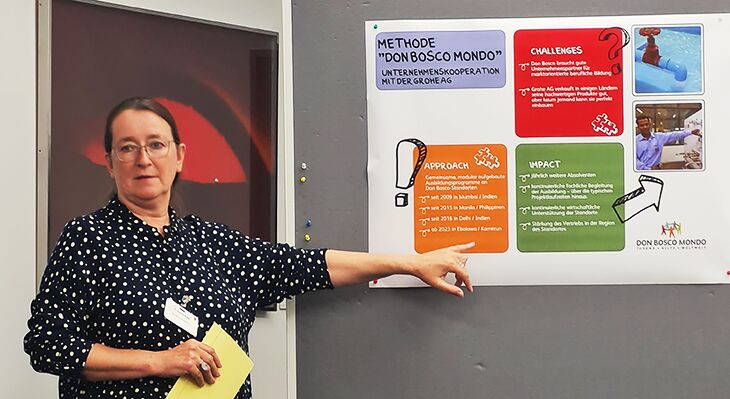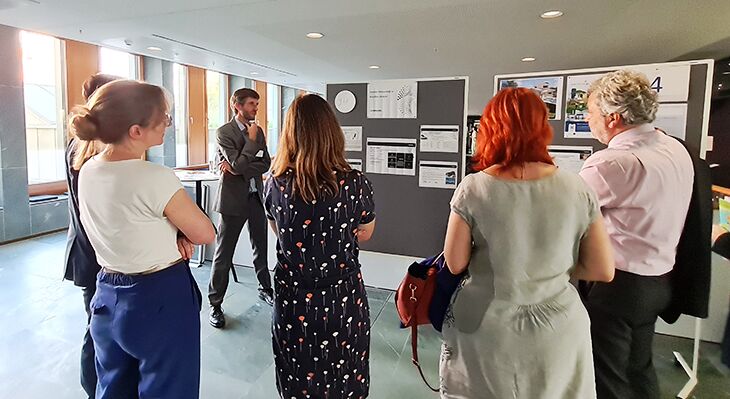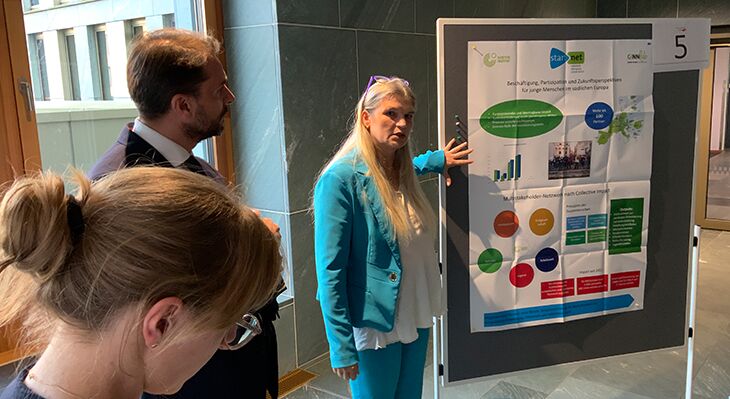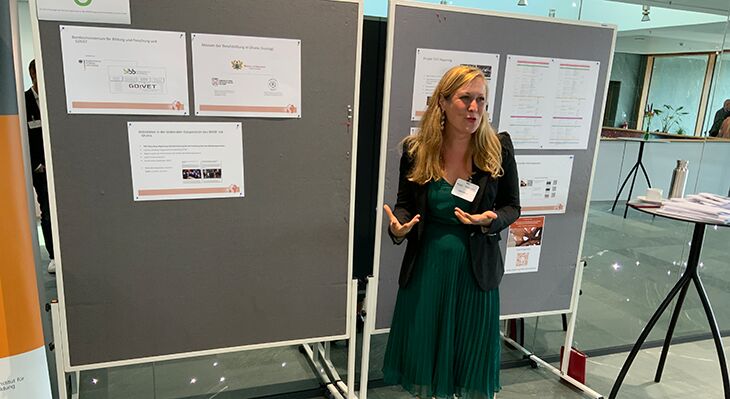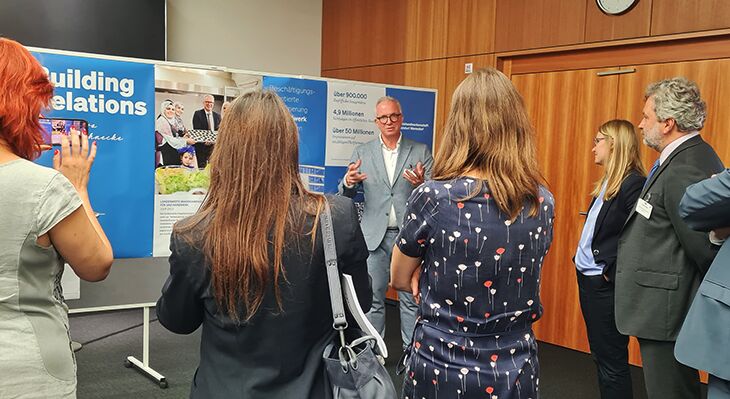10 years of successful international vocational education and training cooperation – review and outlook
State of the Art and Outlook – specialist conference on the “Strategy of the Federal Government on international vocational education and training cooperation” and GOVET
Major stakeholders marked a significant anniversary by convening to debate international vocational education and training cooperation. The central focus was on the contribution this collaboration can make to meeting current and future challenges.
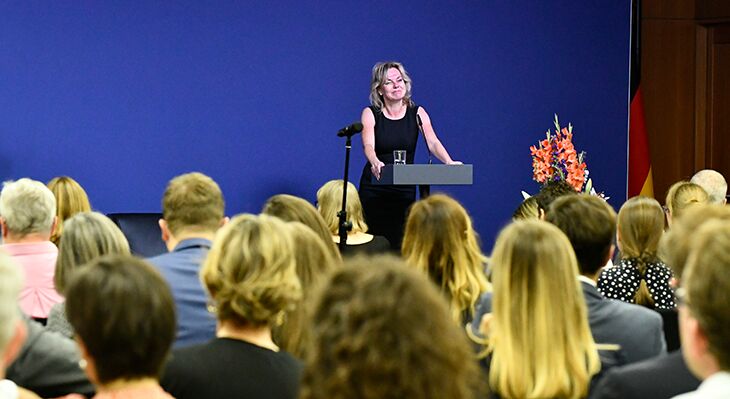
At a special conference staged to celebrate the tenth anniversary both of the instigation of the Federal Government Strategy and of the foundation of GOVET, State Secretary Professor Sabine Döring (Federal Ministry of Education and Research, BMBF) ascribed the highest degree of relevance to international TVET cooperation. She congratulated GOVET and the “international TVET cooperation community”, which has used the strategy to establish a coherent presence abroad and has now developed considerable know-how and expertise. Professor Döring stated that vocational education and training is a key to societal transformation and development all over the world. With regard to the further development of VET cooperation, the main emphasis was on the question of: “How can vocational education and training cooperation help to meet these challenges?”
How can vocational education and training cooperation help to meet these challenges?
State Secretary Professor Sabine Döring (Federal Ministry of Education and Research, BMBF)
Around 120 guests from the action area of Germany’s international VET cooperation at the BMBF came together at the anniversary event in Berlin to discuss what has been achieved thus far and current topics and desiderata. A brief film was shown in which voices from abroad provided a small insight into the reality of cooperation. Cooperation partners gave brief statements to acknowledge the collaboration with Germany and the discernible benefits this had brought their countries. Kerstin Pettenkofer, who is based in Bonn, acted as chair.
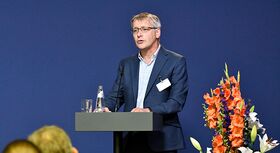
Professor Hubert Ertl, BIBB’s Director of Research, looked back at some of the milestones of international vocational education and training cooperation. Since 1994, this has formed an explicit part of the statutory remit of the Federal Institute for Vocational Education and Training (BIBB), which BIBB’s International Department implements in conjunction with all the institute’s divisions. Professor Ertl said that the adoption of the Strategy of the Federal Government on international vocational education and training cooperation in 2013 – a reaction to the global financial and economic crisis of 2007/2008, which in turn triggered a massive rise in youth unemployment globally – showed that the overall societal role of vocational education and training in an international context had been recognised. The strategy incorporated the foundation of GOVET and the establishment of a Round Table for international vocational education and training cooperation. Since this time, the latter had been supporting collaboration between stakeholders on this basis and had helped to pool know-how and impart expertise both in Germany and abroad. Professor Ertl led into the keynote address on the topic by stating that, following the updating of the strategy in 2019, the focus needed to continue to be on the further development of international TVET cooperation and on facing up to the new challenges associated with the present transformation processes.
During the post-war period, vocational education and training was not governed by law until 1969. Nevertheless, records show that internationalisation of VET was taking place as early as the mid-1950s, initially via parliamentary initiatives which were instigated via the Federal Foreign Office. The establishment of the Federal Ministry for Economic Cooperation and Development (BMZ) in 1961 was followed by other foundations such as the GTZ in 1975 (subsumed into GIZ together with InWEnt and DED in 2011). Alongside other development services, these organisations have devoted greater attention to vocational education and training in development aid projects. Today, GIZ manages around 115 VET-related projects globally. Another notable development has been the establishment of chamber and VET partnerships. These are largely administered by sequa gGmbH, a not-for-profit company set up in 1991. Over the past decades, other stakeholders within civic society have also played an important part in assisting and supporting VET within the scope of cooperative arrangements. These include Don Bosco Mondo, the development cooperation and humanitarian assistance aid agency “Welthungerhilfe” and further organisations besides. The development of foreign chambers of commerce and industry (AHKs) to act as DIHK points of contact for Germany’s economic relations abroad also reflect the increasing significance of international cooperation. Vocational education and training was firmly established as an explicit and systematic component of the work of chambers of commerce and industry abroad as the result of a resolution adopted by the General Assembly in 2012. The foundation of iMOVE in 2005 also integrated the market of German education and training providers into international TVET cooperation structurally. Last but not least, the international mobility programmes in initial and continuing training mainly funded by the BMBF exercise an important function in international cooperation and are often central within practice. The German-Israeli Programme for Cooperation in Vocational Education and Training (Israel Programme) set the ball rolling in this regard in 1969. This was followed by the Franco-German Exchange Programme in 1980, which was renamed ProTandem in 2018 and now enables around 3,000 participants in over 50 occupational groups to gain experience abroad during initial and advanced training. The EU has also been emerging as a stakeholder in occupational mobility since the 1990s. It initially used its LEONARDO Programme as a vehicle to fund occupational exchanges at various levels (predominantly) within the European area. This function is now performed by ERASMUS+. The foundation of the Training Worldwide Programme in 2018 allowed the BMBF to expand the radius, to facilitate stays abroad for German trainees, vocational school pupils and trainers and to support organisational planning meetings all over the world. At an economic and stakeholder level, the core departments have been using numerous funding streams and programmes to support vocational education and training cooperation over a period of many years. The BMBF also maintains VET bilateral cooperation agreements with various partner countries. Since the Establishment of the Round Table in 2013, outward-facing cultural and educational policy stakeholders such as the German Academic Exchange Service (DAAD), the Goethe Institute and the Central Agency for Schools Abroad have been increasingly involved in bringing their specific competencies to bear in the area of VET cooperation.
The value of vocational education and training
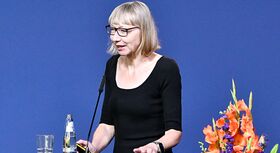
Professor Sabine Pfeiffer (Chair of Sociology specialising in Technology – Work – Society at the Friedrich Alexander University of Erlangen-Nuremberg) delivered a keynote address which created a reflective framework for the conference by placing German and international VET into the context of the multifarious transformations that are currently taking place. She adopted a critical approach to so-called “mega trends” which are maintaining a decisive influence on all areas of life both societally and within research but which, upon closer observation, reveal themselves to be short-lived and exchangeable. Professor Pfeiffer pointed out that the vocational education and training system, especially that familiar in Germany, very much tends to act as a driver of innovation itself rather than simply following trends. People in training and in the workplace in particular were experienced, sensitive and capable in regard to dealing with constant change processes. She would therefore be inclined to expand the five core elements of German by adding the aspects of “innovations” and “integration and social mobility”. She therefore sounded a greater note of urgency in formulating the desideratum for more investment in training and research in order to underline this innovative power and to strengthen vocational education and training as an “enabler” of transformations in the public discourse.
Vocational education and training is an enabler of transformation and development:
Professor Sabine Pfeiffer, Friedrich Alexander University of Erlangen-Nuremberg
GOVET and the German VET cooperation community were working to this end by transporting important basic principles of dual training into the international dialogue: vocationalism as opposed to the rapid acquisition of skills on demand, the relevance of social partnership for democracy and innovation capacity, the idea of sustainable work and the viewing of companies as a social place. International networking in a spirit of partnership was also always linked with the chance of a “reward” in the form of the overcoming of a country’s own national challenges.
Focus on the requirement for skilled workers
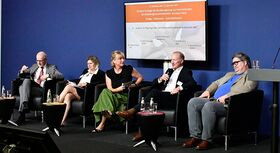
A panel of Federal Government departments on future regional and main thematic focuses featuring Holger Krämer (Federal Foreign Office, AA), Dr. Heike Kuhn (Federal Ministry for Economic Cooperation and Development, BMZ) and Boris Petschulat (Federal Ministry for Economic Affairs and Climate Action, BMWK) rapidly arrived at the red-hot topic area of immigration of skilled workers. Although the perspectives of the ministries vary greatly, the participants widely agreed that international cooperation in VET could assist significantly in securing a supply of skilled labour. Nevertheless, the occurrence of a “brain drain” must not be permitted. Holger Krämer, for example, advocated the development of scenarios which would lead to a win-win success for Germany and the cooperation countries. In this way, young people suffering high levels of youth unemployment in their homeland would be able to come to Germany for skilled worker training and could then pass on their know-how in their own countries at a later point.
Leading the way for both national and international VET, the 2030 Agenda brings together worldwide goals for sustainable social, economic, and ecological development (SDGs). Dr. Heike Kuhn, Head of the Education Division at the BMZ, set out development needs which had been specifically derived from these goals. An expansion of green skills and digital skills was required. Women and men needed to be afforded access to employment in equal measure, and it was necessary for the equivalence of work to be guaranteed internationally. The panel debated the last of these points in particular, including against the background of the Skilled Immigration Act and in light of the conflict created by differing qualification standards all over the world. The feeling was that occupational connectivity should be facilitated internationally, for example via formal recognition.
A member of the audience suggested that the experiences gained from international occupational exchanges would be a promising pathway in this respect. Stefan Schneider, Head of Division for Erasmus and international TVET cooperation at the BMBF, argued the case for more mobility in vocational education and training and made reference to the ongoing investigations into the establishment of a German Occupational Exchange Service within the scope of the BMBF’s Vocational Education and Training Excellence Initiative.
Challenges such as the “3Ds” and the added value of system structures
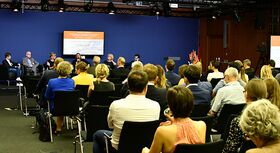
These topics were also reflected in the discussion held between VET cooperation stakeholders and Dr. Volker Born (German Confederation of Skilled Crafts, ZDH), Dr. Oliver Heikaus (Association of German Chambers of Commerce and Industry, DIHK), Jan Krüger (German Trade Union Confederation, DGB), Britta Lambertz (GIZ) and Birgit Thomann (Federal Institute for Vocational Education and Training, BIBB). In her capacity as Head of the International Department at BIBB, Birgit Thomann underlined the remarkably positive development of the cooperation community and the common understanding of its stakeholders of the need to approach partners with a single voice and with coherent provision. Britta Lambertz, Head of the Competence Centre Education, Vocational Education and Training and Labour Markets at GIZ, confirmed that this was an everyday experience. She also welcomed the frequent joint implementation of projects and networking activities with other stakeholders. Particular emphasis was placed on the role of the Round Table for international vocational education and training cooperation, on the associated development of structure, systems and strategic programmes which were producing specific outputs at the operational level, one example from the point of view of the ZDH in this regard being curricular development, on support for small-company structures, on the pooling of action streams in cooperative consortia in the craft trades and on other aspects besides.
The catchphrase on everyone’s lips was the “3Ds” – digitalisation, decarbonisation and demographics. These are currently major factors in the societal transformation process and thus also constitute cross-sectoral topics for vocational education and training cooperation. All panel participants mentioned specific programme approaches aimed at countering these challenges.
As far as the future is concerned, all the contributions indicated that the competence of German VET is held in high esteem internationally and continues to be in demand. However, the logistics governing cooperation activities is becoming more complex and more multi-layered. “Double track” forms part of the motivation for German commitment. Alongside the support provision aimed at assisting governments with their reform processes in a spirit of partnership, Germany also has its own interests. The questions as to how transformation processes can be executed in a socially compatible manner, how digital divisions can be reduced and how the acquisition of skilled workers can be structured fairly can only be answered jointly. This also means becoming more open to input and ideas for the German initial and continuing training system that originate from abroad. And despite all the change processes, the specific design of company practice and the strengthening of structures for attractive VET in the future remain core tasks.
Successful international TVET cooperation projects presented in a “warp conference format”
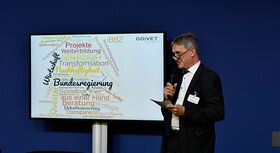
The seven projects which were presented by international VET cooperation stakeholders provided both exciting insights and helpful and inspiring ideas.The challenges faced by stakeholders and project managers in Germany and abroad are highly heterogeneous. National, regional, cultural and sector-specific factors and general conditions all leave a very specific mark on vocational education and training cooperation. In his concluding address, GOVET Head Dr. Ralf Hermann expressed his appreciation and esteem for this competence and for the commitment of stakeholders in international TVET cooperation, including at federal state level, regardless of whether this is exhibited in company-based, school-based or administrative contexts. He noted the valuable and trusting collaboration between the German stakeholders and called for the expansion of long-term partnerships on this basis and for further investment in VET cooperation. Making reference to the keynote address of Professor Sabine Pfeiffer, he concluded with an appeal for vocational education and training to be consciously represented as an engine of societal transformation – both in Germany and internationally.
